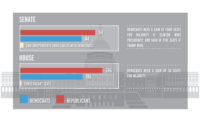Since then, Congress has been unable to produce new long-term bills for highway-transit and aviation programs, which is the reason for all those stopgaps. The newly passed extensions give congressional lawmakers more time to work on the long overdue, new multiyear measures.
House Transportation and Infrastructure Committee Chairman John Mica (R-Fla.) has unveiled a blueprint for a six-year highway-transit authorization, and Senate Environment and Public Works Committee leaders have agreed on a framework for a two-year measure. But neither proposal had been introduced in detailed bill form as of mid-September. Moreover, the two outlines' funding levels sharply differ. Getting a final bill enacted by next March will be a tough task.
There has been more progress on a multiyear aviation bill. The Senate approved a two-year Federal Aviation Administration authorization in February; the House passed a four-year measure in April. But a formal House-Senate conference has yet to meet to reconcile differences. One key difference is funding for the FAA Airport Improvement Program (AIP), which provides construction grants. The Senate version averages about $4 billion a year for AIP; the House bill averages slightly more than $3 billion annually. There also are non-funding differences. A fight over a policy change in the House version of the 21st FAA extension caused a fight with the Senate. The resulting standoff led to a two-week shutdown of $790 million in airport construction projects, a halt in approving new AIP grants and furloughs for 4,000 FAA workers. A deal was reached, and the new stopgap was signed on Aug. 5.
Temporary funding also is the order of the day for federal appropriations for fiscal year 2012, which begins on Oct. 1. As of Sept. 16, none of the 12 appropriations measures that each fund one or more agencies or departments had been enacted. As of Sept. 19, the House had passed six of the fiscal year 2012 spending bills; the Senate had cleared only one. With the Oct. 1 deadline drawing near, House Appropriations Committee Chairman Harold Rogers (R-Ky.) on Sept. 14 introduced a continuing resolution that would keep federal agencies operating through Nov. 18.







Post a comment to this article
Report Abusive Comment